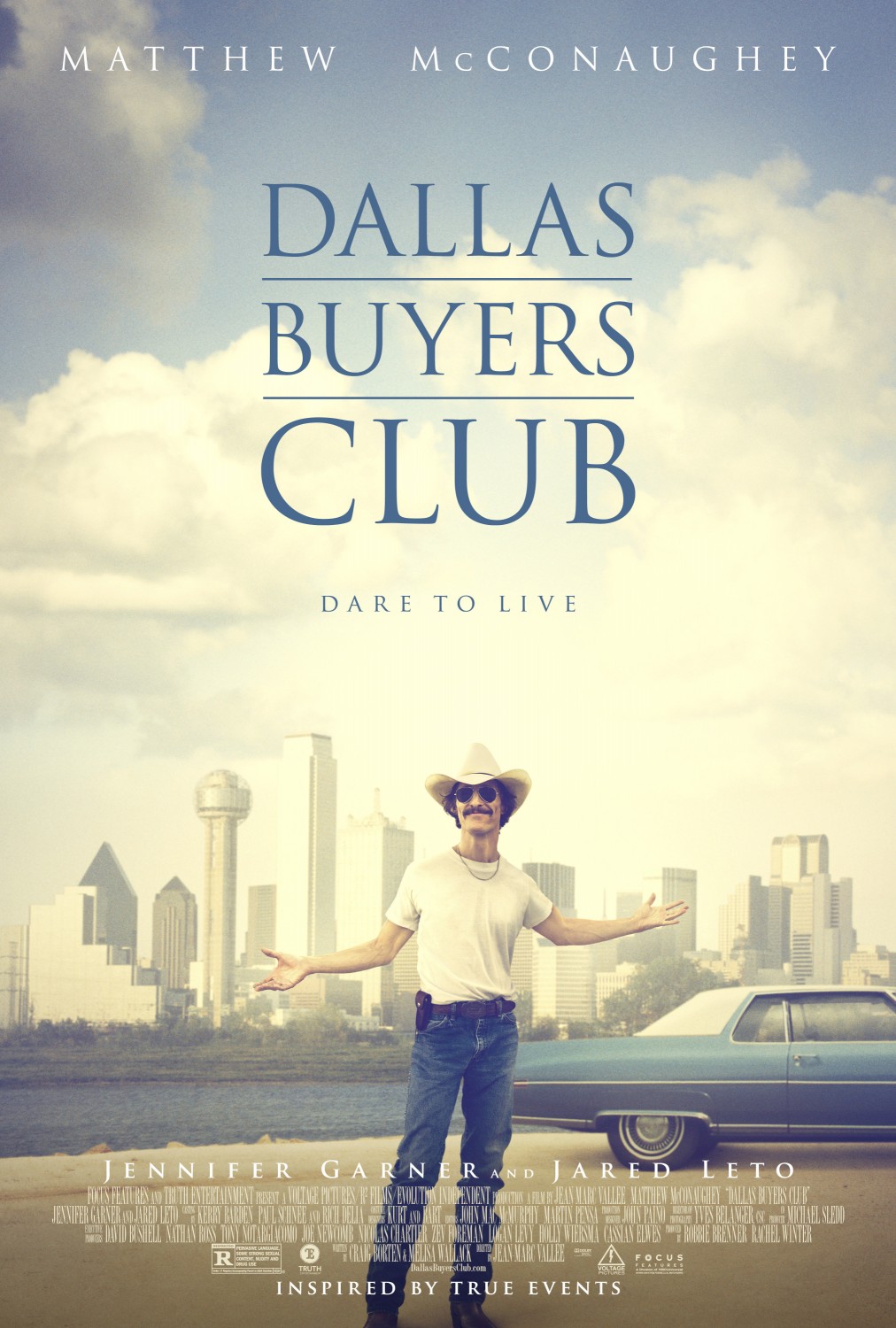 Dallas Buyers Club
Dallas Buyers Club
Directed by: Jean-Marc Vallee Cast: Matthew McConaughey, Jared Leto, Jennifer Garner Running Time: 1 hr 57 mins Rating: R Release Date: November 8, 2013 (Chicago)
PLOT: After being diagnosed with HIV in the 1980s, red-blooded Texan Ron Woodroof (McConaughey) begins a small medicinal business to help provide medicine for those who can't afford what licensed doctors offer. He becomes friends with a transvestite named Rayon (Leto), and strives to earn support from a doctor (Garner) who herself is learning about the strange rules in the business of medication.
WHO'S IT FOR? Fans of Matthew McConaughey; those who like darker stories that follow McConaughey's mantra of "Just keep livin'."
OVERALL
Matthew McConaughey's Woodroof is essentially presented as an actor. In the beginning Woodroof is a self-conscious embodiment of the red-blooded conservative American male, one who speaks ego and pride as if the man himself were following a script. This provides the film its most interesting moments, in which it depicts the expression of masculinity as a necessity to fit in with one's self and with others, who themselves may be trying to defend something.
When Woodroof's situation changes, and he can no longer follow the script, he becomes even more of a performer, this time wearing various disguises and winks, to make him slicker. The problem with this transition in the film, as Woodroof begins to take up a cause, is that we do not know who the real Woodroof is. Secondly, the character's advancement from good ol' boy to winking costume man doesn't exactly fit within reality, but movie reality, where it's perfectly feasible for characters to parade numerous costumes. As soon as we get to finally understand who Woodroof is beyond the script he follows, Dallas Buyers Club turns Woodroof into a purely cinematic character.
In his performance of Woodroof, which had to have been stolen right from the more readily believable choice John Hawkes, McConaughey provides a very physical performance. This is not just in terms of his current shape as a person significantly slimmed down from his usual alpha male physique, but also in terms of body language, hunching his gaunt self and constantly appearing crooked. The same can be for his emotional moments - McConaughey is certainly getting sharper to portrayals of deep, deep sadness in film, especially in a moment here in which Woodroof pulls off to the side of the road, or when he understands his terrible condition when he has a flashback in a quiet library. McConaughey's conveyance of pain is clean, and direct, but it inspires no emotional connection from the audience to the character, performer, or the story they are leading. Instead, they are moments that work better as a simulations with strong precision.
A transformation of similar extremities occurs with Jared Leto's performance, the Lupita N'yong'o of Dallas Buyers Club who provides the bigger picture to the more special example that becomes their respective films' focus. In a couple of wrenching moments, Leto expresses the horror of the AIDS epidemic to a society that was uninformed about it, to a group of people who were chastised because of it. Rayon provides the film its center example of tragedy, while also making for a few warming moments in which a softening Woodroof interacts with Rayon progressively as equals, if not with tinges of true relation. Their unlikely companionship as a heterosexual and a homosexual provides Dallas Buyers Club one of its more special attributes.
Jennifer Garner, taking part in making Dallas Buyers Club a less expected type of reunion for the two leads of McConaughey 1.0's Ghosts of Girlfriends Past, plays a prescribing doctor who is not as vividly drawn as Woodroof or certainly Rayon. She wrestles with an interesting political conflict coated in the film in which she wrestles with doctor protocol versus more logical handling. Though she is handled with lighter usage, even Garner gets her dramatic moment, in which she has a breakdown against a wall.
This story is not supported by performances but a bit of a slave to them, where it's not the actual message of the movie used to garner heart beats, but scenes with capital "I" Important dramatic implications. The success of Woodroof is better experienced in text in the epilogue than the film's events themselves. Even without its awards season timing, Dallas Buyers Club would have an air of superficiality, where the dramatic exercises are distracting from the more compelling debates that sporadically pop up to give the film a more immediate relevancy.
As for the actual buyers club, the script is not sure what can really be done with the existence of Woodroof's entrepreneurship, besides express that it (obviously) had legal issues and (not so obviously) required him to apparently wear goofy disguises whilst traveling through numerous countries. Redundant chapters in which the FDA and/or the IRS come to rain on his potentially very selfish medicinal parade weigh on the running time, which is already dealing with bigger adversity - a lead performance that does all but connect with its audience.
FINAL SCORE: 5/10
